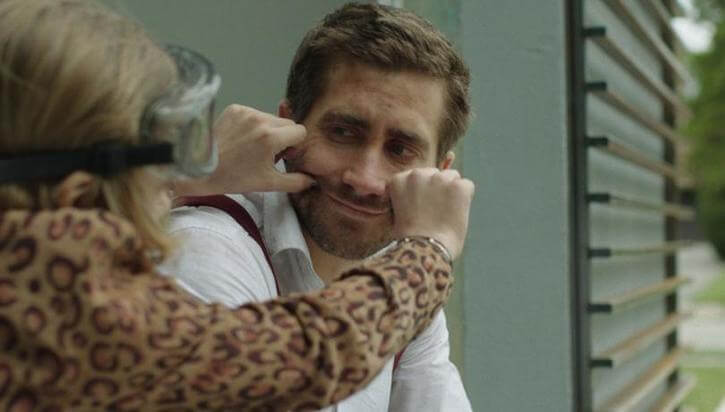Demolition: A Movie Dealing with Grief and Unexpressed Pain


Reviewed and approved by the psychologist Gema Sánchez Cuevas
This movie deals with the subject of the extent to which we’re able to rebuild our lives after severe emotional trauma. There can be little doubt that, on losing a loved one, we can find ourselves in an extremely vulnerable situation, even to the point of losing the true direction of our life. This is the idea posed in the movie Demolition, where grief turns into unexpressed pain.
The plot of this film invites us to reflect on how ephemeral life is by showing us the consequences of a fatal traffic accident. We ask ourselves, how would we react after such a situation? How could we rebuild our lives after an event of such magnitude? We’re going to explore the answers, taking the movie as a reference point.
Brief context of Demolition
The director Jean-Marc Vallé has made a film within the genre of psychological drama. This is a category that gives good room for maneuver at the plot level. In fact, it allows emotions to be depicted from several different points of view. We see the behavior of a person who, after a strong psychological shock, goes through a series of stages until they begin to recover.
The protagonist Davis Mitchell, played by actor Jake Gyllenhaal, assumes a role with which more than one of us will identify. There’s drama and pain, but also humor and sarcasm.
The movie shows us the behavior of the human being in the face of certain tragic events.
In fact, it turns out that Davis, despite the difficulties he’s endured, is ultimately able to move forward with his life. The appearance of Karen, played by Naomi Watts, and her son help him in this regard, and he begins to reconstruct his life. Consequently, there are elements of hope.
“The man only maintains his balance when he moves forward.”
-Maxwell Maltz-
Coping with the loss of a loved one
Everyone has a particular way of coping with the loss of a loved one. Some bury their heads in the sand, while others try to move on and recover as soon as possible. This is where different circumstances come into play, such as experience, personality, or the quality of the support network. The movie raises some important issues in this regard:
- Davis’ figure makes one thing clear. Attitude is everything. Naturally, sadness and dejection influence our emotions, but this doesn’t have to be a permanent or predominant way of being. In fact, we can improve our mood and recover.
- The film revolves around the meaning of the loss and grief of a loved one. Unsurprisingly, after this event, Davis starts to behave in a rather strange and erratic manner. Interestingly, psychologists Enrique Echeburúa and Arantxa Herrán claim that some people are resistant to this kind of behavior, hence they don’t allow it to interfere in their lives and cause them pain.
- Then we see the other side. The process of recovery after the death of a loved one. In this case, the relationship between Davis and Karen shows him that there’s hope.

Empathizing with the protagonist
We see how difficult it is for Davis to come to terms with his situation. This establishes feelings of empathy in us and we find ourselves hoping that all will turn out okay for him.
As the plot unfolds, it gives a hopeful message, awakening our confidence in the final outcome. Because we really want him to get his life back on track. However, it’s made clear that grief is a universal challenge. Indeed, it’s a situation that, sooner or later, we all have to face.
Unexpressed pain can often become an emotional burden. Nevertheless, this can be gradually overcome, as happens with Davis. In this respect, psychologist, Vicente Prieto explains that emotions don’t necessarily appear in an orderly manner. Furthermore, on occasions, they’re mixed with others,
In short, this is a movie with which many of us will identify. That’s because it deals with situations and challenges we might well have been through. The subject is familiar to us, in much the same way as when we watch a documentary about a city we know. Demolition shows us the entire journey of grief, from initial suffering and collapse to the moment when a way out is found.
All cited sources were thoroughly reviewed by our team to ensure their quality, reliability, currency, and validity. The bibliography of this article was considered reliable and of academic or scientific accuracy.
- Echeburúa, E. y Herrán, A. (2007). “¿Cuándo el duelo es patológico y cómo hay que tratarlo?” en Análisis y Modificación de Conducta, Vol. 33, N° 147. Universidad del País Vasco.
- García Fernández-Abascal, E. et al. (2010). Psicología de la emoción. Editorial Universitaria Ramón Areces. Madrid.
- Prieto, V. (2018). La pérdida de un ser querido. La esfera de los libros. Madrid.
- Vargas Solano, Rosa Elena. (2003). Duelo y pérdida. Medicina Legal de Costa Rica , 20 (2), 47-52. Obtenido el 31 de octubre de 2021 de http://www.scielo.sa.cr/scielo.php?script=sci_arttext&pid=S1409-00152003000200005&lng=en&tlng=es.
This text is provided for informational purposes only and does not replace consultation with a professional. If in doubt, consult your specialist.








